
Buying your first home is an exhilarating experience. You’re probably juggling a dozen things or more to ensure you’re making the right choice. We believe that gaining insight into your future HVAC system is vital. The property’s HVAC system represents a substantial investment and source of potential long-term costs, illustrating why a detailed inspection should be a top priority for first-time homebuyers.
In this guide, we’ll share seven tips for discovering all there is to know about a home’s heating and cooling setup. And if you want a deeper opinion from the pros, feel free to call JBR Mechanical. Our seasoned technicians can help you compare your options with industry insights that are second to none.
1. Which Kind of HVAC System Does the Home Use?
Start by identifying what kind of HVAC system the home includes. Furnaces tend to last longer compared to air conditioners, and relatively new types of HVAC equipment like heat pumps feature average life spans that are impressively long. Knowing the make and specific model ensures you have a much better sense of how much it might cost in upkeep over time.
2. How Long Ago Was the System Installed?
Another good idea is to find out how old the HVAC system is when you're considering a potential new home. In general, HVAC systems should survive for around 10-12 years. Learning its approximate installation date helps you plan for possible repair needs or considerations if it might eventually stop working. Older systems may be more vulnerable to problems, so fiscal planning for a replacement unit could be necessary sooner than you thought.
3. What Does the Warranty Cover?
Check if the HVAC system is covered by a warranty. If it is, that's great news because it can help with maintenance costs. HVAC warranties often cover parts and labor, but it's important to note that details will vary. Review any terms you don’t recognize to make sure you fully understand your coverage and potential out-of-pocket costs.
4. When Was the Last Time It Received Maintenance?
Don't forget to check the maintenance history of the HVAC system, if this kind of history is available. This kind of information can demonstrate if the system constantly broke down or how often a tune-up was scheduled. Ask about records for key tasks like filter changes, which is a positive sign indicating regularly scheduled tune-ups.
5. Are You Aware of the System’s Energy Efficiency Ratings?
Finding a home that features an HVAC system with strong energy efficiency means lower utility bills and less of an impact on the environment. Look for the seasonal energy efficiency ratio (SEER) ratings for air conditioning as well as the annual fuel utilization efficiency (AFUE) for furnaces. The higher the SEER rating, the more efficient the cooling over the whole season, while higher AFUE ratings indicate that the fuel is efficiently converted into useable heat.
6. Have You Noticed Signs of Problems During Your Inspection?
Even if you don’t have experience in HVAC systems, you can still take a moment to inspect the HVAC system on your own. Keep an eye out for signs of problems that haven't been mentioned by the seller. This might consist of odd sounds, stubborn patches of the house that are too hot or cold and attempts to hide any obvious damage.
7. Is an Experienced HVAC Technician Available to Help?
If you're still hesitant to make an offer because of the current state of the HVAC system, it's beneficial to get a professional opinion from certified HVAC professionals. They will be much more likely to catch things you might not, like refrigerant leaks, damage to the wiring or flawed ductwork.
A Consultation with JBR Mechanical Helps Take the Stress Out of Your Home-Buying Journey
Selecting your first home is meant to be a joyful event, and JBR Mechanical can ensure yours is too. Connect with us at 812-266-9785. We can go over the details about how our HVAC services give you peace of mind, giving you what you need to step into your new home with confidence.
